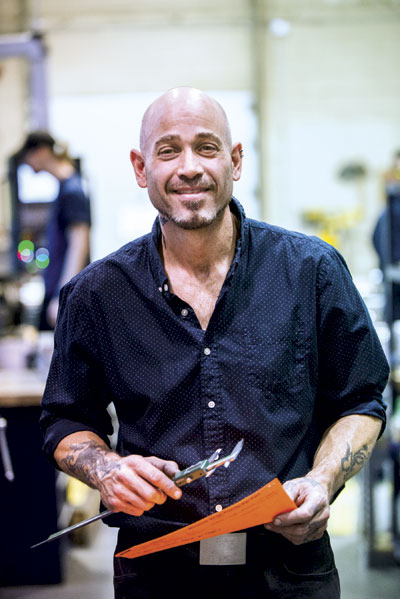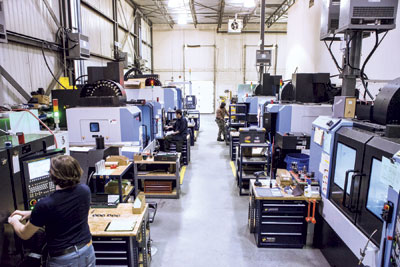Article by Kip Hanson
Photos by David Afriat
Montreal packaging machinery manufacturer embraces CNC in a big way
THE PROBLEM: Outdated machine tools and high subcontracting costs hamper company growth
THE SOLUTION: Upgrade the machining department with five new vertical machining centres
When the costs for outsourced machined parts began to soar, Daniel Lachapelle, founder and CEO of Aesus Packaging Systems, Point-Claire, QC, knew he had to make a change. “Not only were we sending out more and more work, but the prices were starting to increase, in some cases by nearly 300 per cent,” he says. “We couldn’t live with that long-term, so I did an evaluation and found the only way we would remain competitive was to make the parts ourselves.”
In short order, he transformed his small shop, which at that time consisted of several tired NC machines and a handful of manual equipment, used primarily for tooling and repairs. After purchasing six Doosan machines, including five vertical machining centres, from Eastern Canadian distributor, Ferro Technique, he soon had a full-fledged CNC machine shop,
 Riding the rollercoaster
Riding the rollercoaster
Packaging machines are complex devices. Responsible for converting a basic bottle or box into a logoed company statement, they slap on labels, screw on tops and fill plastic containers at the rate of thousands of pieces per hour. If a machine falters, perishable goods are at risk and store shelves may suffer. Lachapelle understands all this. He’s worked in the packaging machinery business for more than three decades, and is well aware of what’s needed to build quality equipment.
He started the company in 1995, working from a computer in his bedroom. Aesus has since grown to 105 employees and a 4,645 sq m (50,000 sq ft) facility. And although it hasn’t always been easy, Lachapelle persevered to the point that his company is now one of the largest machinery builders in the province, designing and manufacturing a huge variety of custom packaging equipment.
A big part of Lachapelle’s strategy is vertical integration. From cappers and conveyors to fillers and sleeving machines, the Aesus team makes most everything needed to assemble any type of packaging machinery. “We have the CNC machine shop, of course, but also a laser cutter for sheet metal,” he says. “We do all of our own bending, welding, and polishing, electronics assembly and even our own control boxes. Granted, we still buy the nuts and screws, some injection moulded parts, electric motors and such, but pretty much all of the metal or plastic components are produced in-house.”
Bringing it home
It wasn’t always like this. When Lachappele first decided to purchase the Doosans, most parts were still being subcontracted to area machine shops and fabricators. He says this was fine when the company was smaller, but Aesus was undergoing a period of rapid growth, and profit margins were beginning to suffer.
At that time, Lachapelle had a number of large sheet metal parts that were causing lead time problems, so he started his improvement plan there by purchasing a CO2 laser from TRUMPF. He also invested in some bending and forming equipment. His decision turned out to be the right direction for the company, as it saved Aesus, “a lot of time, a lot of money, and a lot of inventory.” He soon turned his focus on the machine shop.
 At first, Lachapelle had planned to simply buy a small shop, but that turned out to be “not in the cards.” He again did his research, and after narrowing the field down to three brands of machine tool, began leaning toward Doosan, not only for the equipment’s technical specifications but also for its reputation of good local support. Working with Daniel Poirier, sales manager of Ferro Technique Ltd., the Doosan distributor for Eastern Canada, he selected six CNC machine tools – four Doosan DNM 500 II vertical machining centres and a pair of Puma 2600Y mill-turn lathes.
At first, Lachapelle had planned to simply buy a small shop, but that turned out to be “not in the cards.” He again did his research, and after narrowing the field down to three brands of machine tool, began leaning toward Doosan, not only for the equipment’s technical specifications but also for its reputation of good local support. Working with Daniel Poirier, sales manager of Ferro Technique Ltd., the Doosan distributor for Eastern Canada, he selected six CNC machine tools – four Doosan DNM 500 II vertical machining centres and a pair of Puma 2600Y mill-turn lathes.
Less inventory, lower costs
There was one problem, however: he didn’t have anyone to run the machines. His existing crew had no experience with CNC, let alone the knowledge and experience needed to set up what would soon be a full-blown machining facility. Taking a somewhat unorthodox approach to staffing, Lachapelle turned to the machine tool sales people for help, letting everyone know Aesus wouldn’t be purchasing any equipment without a qualified individual to manage six new pieces of high end equipment. The word spread and Lachapelle soon had a handful of resumes, from which he hired machine shop manager, Chris Heidt.
 The only other fly in the ointment was one of efficiency. It was a good problem to have. Lachapelle had underestimated the potential output of the Doosan CNC lathes, and quickly discovered he’d bought one too many. He was pleasantly surprised when Poirier agreed to replace the lathe with a DNM 750 II machining centre, a 50 taper version of the four existing DNM 500 II machines, but with greater horsepower and 1630 mm (64.2 in.) of X axis travel, giving Aesus some much needed machining capacity for larger parts.
The only other fly in the ointment was one of efficiency. It was a good problem to have. Lachapelle had underestimated the potential output of the Doosan CNC lathes, and quickly discovered he’d bought one too many. He was pleasantly surprised when Poirier agreed to replace the lathe with a DNM 750 II machining centre, a 50 taper version of the four existing DNM 500 II machines, but with greater horsepower and 1630 mm (64.2 in.) of X axis travel, giving Aesus some much needed machining capacity for larger parts.
Two years later, the shop is running two full shifts, and Lachapelle is thinking about adding a third. As with most shops these days, there were some growing pains with finding enough operators and machinists for a full stable of equipment, never mind all the tooling, programming, and setup that goes with hundreds of new parts. But Heidt was a huge help with all this, and today, everything is running smoothly.
Lachapelle notes that he still subcontracts some work to other shops, but that will hopefully change with another shift. And despite a substantial increase in company headcount, profitability has increased by 10 to 12 per cent, most of which is thanks to lower part costs. He’s also decreased inventory levels and can turn around rush jobs much more quickly, helping cash flow and customer satisfaction.
Because of all this, Aesus recently needed to expand its facility, and Lachapelle is planning to add even more space soon (and possibly purchase additional equipment for the machine shop). He’s entertaining orders from the Mexican market, has his sights set on Europe, and is considering a cylindrical grinder for doing shaft work. “Bringing the work in-house was definitely the right move,” he says. “I have a great team working for me, and the support from Ferro Technique has also been quite good; the one or two times we’ve had a problem or any sort of question, they were here to help us out quickly. Overall, I’m very happy with my decision.” SMT
